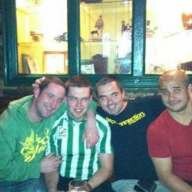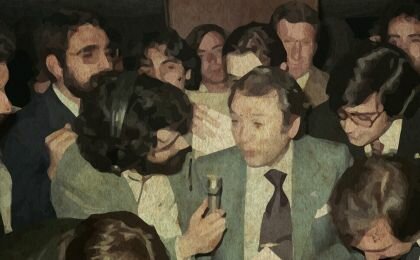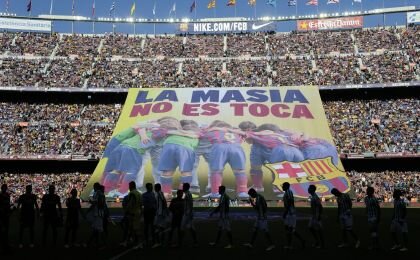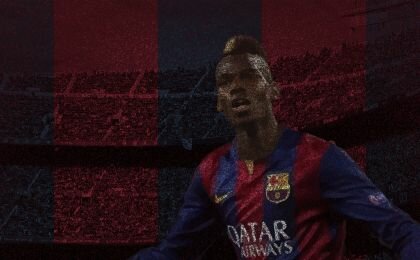 history | 2015-07-02
history | 2015-07-02
Josep Lluís Núñez’s rise to power
How the now imprisoned businessman became the president of FC Barcelona
At the beginning of 1978, FC Barcelona was in a period of transition, creating their own social transformation by allowing all of their socios to participate in the presidential elections. After many years during which only the delegates had the right to vote, from that moment on, all of the socios would be able to choose between the nominees. The first few months of that year served to create the ideal conditions that would allow the organization to vote on an unprecedented scale in the history of sports clubs. After the election registration process, which determined that there were 53,688 socios with the right to vote, the elections were called for May 6, 1978.
On January 26 of that same year, the city was in a state of shock due to the murder of Joaquim Viola, mayor of Barcelona in the mid-1970s and part of the blaugrana board of directors during Francesc Miró-Sans’ reign. Among those who had presented their candidacy to the club president were Josep Casals, Francesc Pérez Mateu, Nicolau Casaus (president of the Solera peña) and Ferrán Ariño. The day after Viola’s murder, Victor Sagi (veteran Barcelona socio with club pedigree) presented his candidacy. He was followed by Josep Lluís Núñez, owner of a construction company and the only candidate with no previous recognized history with Barcelona. In order to be recognized as an official candidate, the applicants needed to present 1,872 signatures, a feat achieved by all but Pérez Mateu.
On April 13, 1978, the first incident occurred that made people think that there was some kind of Black Hand involvement behind those elections. Victor Sagi, the candidate who had collected the most signatures and who was a big favorite in the polls, withdrew from the electoral race after giving a press conference which shed little light on his strange decision. In his own words, there were “too many candidates for the presidency.” Nevertheless, it made little sense that the man who had the most support from the social masses withdrew in such a surprising manner. Rumors began to spread throughout the Catalan capital. Almost everyone agreed that someone had sent him a letter in which they threatened to leak the news that the publicist was having an extra-marital affair. One of the candidates, Ferran Ariño, claimed that Pablo Porta, president of the Spanish Football Federation, had a copy of this letter: “I saw it, I do not have it but I saw it. Porta called us to his hotel room on the day of the Copa del Rey final and he showed us the notorious letter in which somebody threatened to publicize Sagi’s relationship with a French model.” That day, in the Plaza del Madrid hotel, before the Copa del Rey final in which Barça defeated UD Las Palmas, the president of the federation gathered the candidates for the Barcelona presidency one by one to consider their candidacy and he showed them the embarrassing letter. Shortly after dropping his candidacy, the publicist closed his business in Barcelona and migrated to Brazil.
After decades of silence on the matter, the Audio-visual Communication professor Armand Balsebre wrote a biography about Victor Sagi. In said book, Sagi pointed out that the reasons for withdrawing his candidacy were related to the fact that he did not want to align himself with either of the camps, a rather inconsistent argument if you bear in mind that his was the candidacy with the most support. In this biography it is also pointed out that the entrepreneur did not want to be a candidate for the club presidency, that in reality, he presented himself “because of the pressure from the Catalan nationalists around him who were close to Montal’s board of directors. Additionally, Jordi Pujol initially defended Sagi’s candidacy but he never did so publicly because Montal demanded that there was to be no political interference.” These arguments which were exposed in Sagi’s biography have credibility, as there are many testimonies of interference/pressure from the within the Convergència i Unió (CiU) in the blaugrana electoral process since the restoration of democracy. What happened with the CiU has also happened with other parties throughout the last four decades of Barcelona’s history. The social power of the sporting entity with the most socios in Catalonia has always been an appetizing prospect for political leaders. Nevertheless, the fact that Sagi counted on the support of Pujol or the Catalan nationalist sector which will inherit Montal’s board surely cannot be considered arguments for his sudden withdrawal from the elections. The facts, testimonies about the letter, and his departure for Brazil seem to contradict the arguments expressed in this publication.
The elections ran their course without the main candidate for victory. On April 20, in the middle of the campaign’s crossfire and the Floral Games between candidates who were looking for pacts, FC Barcelona celebrated winning the Copa del Rey in the Palau de la Generalitat, in President Tarradellas’ first reception for a winning team. The scarcity of Barcelona victories at the time and the presence of Molt Honorable meant that the streets were filled with Catalan flags and that the celebrations would go on until after two in the morning.
Meanwhile, the candidates for the presidency were reduced to three, after Joan Casels agreed to an offer to join Núñez’s candidacy in exchange for the role of vice president. On April 25, two weeks before the elections, a meeting took place between Núñez and Casaus. The president of the Solera peña pointed out that they hadn’t reached an agreement with the construction entrepreneur. Casaus went on to make the following statement before the media: “If I lose the elections and then become allies with whoever wins, I will be a pig.” During the last few days of the elections, there were approaches made among the three candidacies, although no agreement was reached for any of them to be integrated into any of the others before knowing the election results.
With the elections a week away, Núñez decided to display his economic might in order to win at the polls. Thus, he offered money to Barcelona’s two biggest stars at the time, Johan Cruyff and Carles Rexach, to show their support for him in public. The Dutchman ended up earning $1 million for lending his image. “They were going to offer us $500,000 to endorse his candidacy. It seemed a small amount to Johan and, finally, they paid us a million. They paid us religiously via a contract in an apartment on Paseo de Gracia,” noted Michel-Georges Basilevich, the Dutch footballer’s French representative.
Núñez, linked with Alianza Popular and UCD by the media, distanced himself from any ideologies and presented himself as the only candidate who had no political interests, facing the support that Ariño had from Convergència and that Casaus had from PSC. Without the support of well-known Barcelona families and unknown by the average Barcelona socio, Núñez knew that his means of gaining power was in his own hands and he spared no expense during the campaign. The entrepreneur invested P90 million during the electoral process, while Casaus and Ariño had a budget which was below 4 million pesetas.
On May 6, 1978, the voting took place in the Camp Nou grounds. There were 53,688 socios had the right to vote, that is to say, those who were over the age of 21 and had been paid-up members for four or more years. Election day was calm but tense, the most noteworthy incident being Josep Lluís Núñez protesting at his polling station over the presence of a lorry carrying propaganda in favor of Ferran Ariño around the stadium. A group of protesters began shouting “Fascist! Fascist!” at Núñez, while his followers directed inflammatory gestures toward those who were causing offense to their candidate. Jordi Pujol was one of the last Barcelona socios to arrive at the Camp Nou enclosure. “I voted for Ariño but I think that it is a mistake to mix politics with sports. What we need now is genuine Barcelonism,” noted the then leader of Convergència.
Of the 53,643 people who had the right to vote, 26,487 exercised this right, almost half of the electoral register. Josep Lluís Núñez emerged victorious with 39 percent of the votes, while Ferran Ariño got 36 percent and Nicolau Casaus, 23 percent. The defeated candidate, the man representing Convergència in the presidential running, pointed out: “I never would have thought that Barça could be bought.”
On the 10th, four days after the election, the new blaugrana president was welcomed at the Palau de la Generalitat by Josep Tarradellas together with his future vice presidents, Josep Casals and Joan Gaspart. The biggest surprise at this reception was the presence of Nicolau Casaus, which led to speculation that the defeated candidate would become a member of the future board of directors. A day later, the rumor that was making the rounds throughout Barcelona during the campaign was confirmed: Casaus had a pact with Núñez to become a member of his board of directors in the event that the real estate entrepreneur won the elections. After the rumor had been confirmed, he became the club’s vice president, going back on his word that he had given during the electoral campaign. Although it has never been proven at any time, historians and investigators of FC Barcelona’s recent history are opting to think that Núñez’s strategy was for Casaus to have a candidacy separate from his own which would serve to take votes away from his rivals; initially, from Victor Sagi, then, once he was eliminated, from Ferran Ariño. The fact that Casaus was a man from the Barcelonist establishment and that he was traditionally linked to the Solera peña and to Catalan nationalism, meant that he had a very similar profile to the other two. In other words, the inclusion of his candidacy in the final elections divided the Catalan nationalist vote, meaning that Núñez would have certain victory by gaining the non-Catalan nationalist vote and, especially, the vote from the supporters clubs, that had always been well-looked after by the Barakaldo-born leader.
Just like that, things came to a head, drawing from the facts and opinions of the main characters that lived through these events, you can conclude that Casaus had agreed with Núñez upon his presence in a future board of directors. The president of the Solera peña knew that he barely had any chance of winning the elections, but that he could be helpful when it came to dividing the vote with the construction entrepreneur’s true rival, Ferran Ariño. There was another fact which supports this theory: Casaus’ textile business, Camps, Casaus y cía, was experiencing severe economic difficulties at this time. A few days after the elections, many of the employees who belonged to this company went on to work for the company belonging to the new blaugrana president, Núñez y Navarro.
The new blaugrana president was originally from León, in the Basque country and had been living in Barcelona from the age of 7; he represented a completely different profile from all of the Barcelona presidents who had gone before him. A son of a Spanish military policeman working in customs, his father was moved from the Basque country to Portbou, in the Catalan Pyrenees, when the future blaugrana president was just seven months old. Thus, he is the only non-Catalonia born Barcelona president since the war, although he did grow up and receive his training in this region. After getting married to María Lluïsa Navarra (daughter of a modest construction worker), he became a partner of his father-in-law and was able to remodel a company which would come to be known as Núñez y Navarro, benefitting from times of porciolismo to become one of the most important construction companies in Catalonia and in all of Spain. Far from the tradition of the top executives being linked with the textile industry, he belonged to the booming sector of the 1970s, the urban sector. An apartment owned by Núñez y Navarro on any given corner in Barcelona became a distinctive social brand for the most vibrant bourgeoisie. While the business grew during the last few years of the Franco dictatorship, the clandestine left was showing its resentment for an entrepreneur who was considered the prime example of a ruthless, money-hungry property developer.
Núñez came to power with the endorsement of being a thriving and powerful entrepreneur who had built an empire having started from nothing. He did, however, lack Barcelona pedigree; his figure did not carry much weight among the culé faithful. Because of this, he saw in his vice president Nicolau Casaus the perfect counterweight, a man perfectly integrated into the Barcelona entorno, with a vast knowledge of the club’s social life and a close friend of the most important veteran footballers. Although he was born in Mendoza, Argentina, Casaus’ family migrated to Igualada, in the province of Barcelona, for economic reasons. Apart from working for the textile business managed by his father, he showed his passion to FC Barcelona from a very young age. At just 20 years old he founded the Penya Germanor Barcelonista, one of the most active at the time in all of Barcelonism. After the Civil War, he was arrested because of his Catalan nationalist and anti-fascist activism, as leader of the UGT in Igualada, as well as for not complying with the military rebellion. The court martial condemned him to a life sentence, a sentence which could reach 30 years imprisonment. In various interviews that Casaus gave as blaugrana vice president, he created an image of his person which was far from reality, especially when he pointed out that he had been sentenced to death, something which never happened.
After leaving prison five years after his sentence, he resumed his activities related with FC Barcelona. As has already been discussed in other summaries, he was a founding member of the Solera peña, whose base was on Calle Pelayo in Barcelona, the city where he set up his textile business. Between 1948 and 1966 he was the president of this organisation, possibly the most powerful business name within Barcelonism, capable of shaping opinions among fans and, especially, among other peñas. Although he did not have an executive position at the club, he was one of the organizers of the Camp Nou’s organizing ceremony. In 1965 he ran in the presidential elections which were won by Narcís de Carrera. He tried his luck again 13 years later in these elections in which he ended up making a pact with Núñez. Due to his extensive track record, Casaus was a man known by all within Barcelonism, he was very familiar with the inner life of FC Barcelona and that of its fans. In short, he had everything that Núñez was lacking in order to control a club of the social dimension of Barça. One represented management and office work, the other, the club’s image to the world.
Núñez’s rise to power was surrounded by controversy. The withdrawal of the candidate Victor Sagi, the supposed agreement with Casaus, and the payment to Cruyff and Rexach for publicly supporting his campaign were all subjects which were never fully clarified. A decade after his election as president, a series of articles in the Triunfo magazine and in a book brought his ascension to power into question once again. After several documents questioned the methods of Barcelona’s top executive, Josep Ramoneda wrote a column in Triunfo revealing the manner in which Núñez came into power. In the opinion of this journalist and philosopher, there were various factors which ensured that Núñez ultimately gained power. On one side, he noted the purchase of the team’s two great stars, Cruyff and Rexach, for his cause: “I am sure that Cruyff and the construction entrepreneur have money in the same position in their personal scales of values: the top.”
The second reason, according to Ramoneda was the inhibition and disorientation of the Catalan left in the presence of one of the entrepreneurs who had been criticized most in times of great speculation. In Ramoneda’s opinion, the mistake by Raventós (head clerk of the PSC) was supporting Nicolau Casuas “who, as has been proven, was a very well-placed wedge by Núñez to take votes away from Ariño. Casaus, in addition to lots of verbosity and stories, has a much more presentable business card than Núñez, in both the fields of Catalan nationalism and of Barcelonism.” After explaining these arguments, Ramoneda highlighted Victor Sagi’s resignation as being crucial in the construction entrepreneur’s ultimate victory and ascension to power. In his article, he wrote about incidents of blackmail and pressure which would never see the light of day and which completely changed the electoral outlook. Finally, he launched a series of attacks which made clear his opinion about the man who had just completed a decade as blaugrana president: “Until now, the only promise which is still on track is the one to extend that stadium’s stand. On top of that, the joke is saying that, from now on, the corners on Barça’s pitch will be called bevels continues to take shape. As always, José Luis Núñez, he who got married to Mrs. Navarro for money, giving rise to the Núñez y Navarro Empire, wherever you look, is building something.”
The first few years of Núñez’s presidency were defined by problems with the press, which were not scarce. Joan Gaspart, the club’s second vice president, went on to say the following to media representatives: “Having our part of the television, I piss on the press.” The confrontation with the media got to the point that the new president hired his own protective detail, a group of socios who gave him constant support and who were responsible for silencing any criticism that was directed toward him. In some cases, their methods were questionable, with reports of threats and insults. They were known as “The Dark-Skinned People.” Among their most controversial actions, in 1980, they dented the car belonging to the journalist Alex Botines, who was critical of Núñez. A year later, they had become famous for chasing after a group of Barcelona-based reporters with stones and bottles after a match between Barça and Hércules. Even though the discourse from Núñez’s board of directors had a tone of contempt towards the press, their actions showed just how worried they were about everything they did, because, on top of this unofficial scare group, a Commission of Press Relations was created, which had as its objective control of the journalists who were most critical of his presidency: Josep Morera Falcó from El Correo Catalán, Alex Botines from El Periódico and Francesc Castellanos from 4-2-4. In Morera Falcó’s case, he was the head of sports at his publication, and was one of the most renowned photojournalists in Catalonia. The sharp criticisms of Núñez in his articles led to pressure on the paper. On August 21, 1979, Morera was called to the office of the paper’s assistant manager where they informed him of his relief as head of sports. A week later, the manager would end up offering him an early and economically advantageous retirement. Nine years later, in 1988, Josep Morera Falcó published a book titled Un Barça triomfant? (Antologia d’una incongruència), a devastating text about Núñez’s rise to power. In the text, he exposed the deals, hidden operations and buying of consciences that the construction entrepreneur had carried out in order to become president, given that he was a relative unknown among the blaugrana faithful. Núñez decided to buy the complete edition and the very publisher to silence him. This was the climax in the often difficult relationship between Núñez’s board of directors and the press.
The views and opinions expressed on this article are of the author only and do not reflect those of Grup 14 or any of its members. The content here belongs to Grup 14 and its many collaborators.










